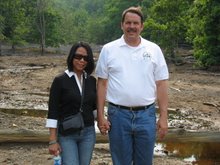My research in alternative energy has turned up a lot of what I would call “gloom and doom” predictions. Some articles go as far as to predict widespread chaos, and a total collapse of the economy. I guess that some that are looking into alternative energy are doing so in order to protect themselves from a major energy infrastructure breakdown.
Since we’re already seeing gasoline prices rise at an alarming rate, it’s not hard to believe that these predictions have merit. Food will certainly be more expensive in the future due to processing and shipping costs. If this trend continues, we may eventually see only locally-grown items on the shelves.
It’s not hard to imagine gas prices so high that we only drive in emergency situations. High heating costs could force many of us to lower our thermostats and to wear warmer clothing indoors. A major increase in the cost of electricity might prompt us to cool our homes with fans instead of central air conditioning.
Shortages or costly electricity and heating oil need not be a problem for those who prepare in advance. For a modest investment you can generate enough electricity to exceed your basic needs via solar or wind power. It would be wise to consider alternative heating systems that eliminate your dependence upon natural gas pipelines or other utility-supplied energy. Learning to grow and preserve food could also prove to be a valuable skill.
Those who prepare in advance will not have to venture out for solutions in the event of a crisis. At that point, it’s too late anyway. The necessary items will probably not be available. In a serious crisis, those who don’t prepare will need to be rescued. If help comes at all, it will probably come from ordinary citizens, not the government. The aftermath of Hurricane Katrina should have taught us that. Meanwhile, some will become victims of looters and others desperate to help themselves. Those who don’t have to venture out are the ones most likely to survive. Those who live in the suburbs are more likely to survive than those who live in crowded areas where there will be a lot of competition for few resources.
We typically have food in our pantries, and some of us have emergency water and food stored away, but what do we do when these items run out? We’re sometimes told to keep a 72 hour supply, but we’ve seen that in some emergencies it has taken longer than that for help to arrive. In many cases, rescued survivors were dehydrated, exhausted, cold, and tired. This won’t happen, even in an emergency where help is slow to arrive, for those who’ve made self-reliant living their goal.
Those who incorporate elements of self-reliant living into their daily lives are not only better prepared to handle emergencies, they’re also saving money on their utilities everyday. Those who grow their own food are most likely getting more exercise than those who do not, and they’re certainly eating healthier food.
Surviving a long-term emergency requires skills that the average person does not possess, and advance preparations. Given the current state of the world, this is a good time to acquire those skills and the necessary equipment. Hopefully, with enlightened leadership, a crisis of major proportions will be avoided and they won't be needed.
Begin by assessing your basic needs, and then look into the most efficient ways to meet those needs. After satisfying your needs for water and food, next consider shelter, heating and cooling, and electrical power. Don’t skimp on your electrical system since it can help to preserve (refrigerate), and prepare (cook) food. You'll probably need to boil the water you'll use for drinking. Your system needs to be large enough to do these things as well as to provide lighting, air circulation, and to power a radio and other equipment. Test your systems once in awhile by simulating a failure of utility company supplied electricity and fuel. You might find that your emergency equipment can be used to reduce your household expenses, and to preserve natural resources such as coal and oil, a win-win situation.
When Technology Fails, a book by Matthew Stein, is a good source of information.
Solar John
Subscribe to:
Post Comments (Atom)








No comments:
Post a Comment